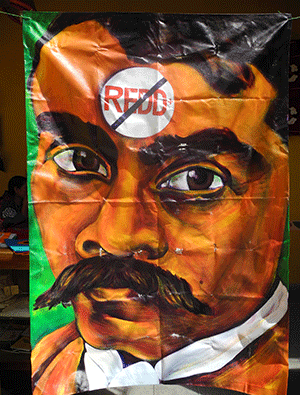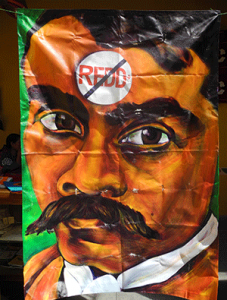Ojo on What Happens with CA Cap-and-Trade

One of the recent big environmental news was the successful auctioning of permits under California’s new cap-and-trade system. It is big news because the law and program have survived this far against several legal challenges. It is big news because it would the second-largest marketplace after the European Union system. It is also big news because it will be closely watched in the US to see how it will work as a tool for reducing greenhouse emissions— the whole idea of a carbon tax and setting up a market for carbon credits has developed as a key component in the overall discussion on dealing with climate change.
Politically there is a whole story to follow on cap-and-trade and the whole idea of regulating carbon has had to fight the label of being a “job killer”. However, more and more, industry and business leaders are calling for a carbon market, seeing the public opinion change on the topic and realizing it is in their best interest for the bottom line. Simply put, it is become more and more clear that “being green” can be very good for business and the “carbon market” is one of the next areas to ensure profitability.
However, more and more, the mechanisms needed to make some of these carbon markets works are clashing with the needs and concerns of Latino communities in the US and abroad.
What is becoming a classic international example is the issue of REDD (Reducing Emissions from Deforestation and forest Degradation), as outlined in this piece in YES Magazine. The main issue there is that the forests needed to provide carbon offsets are the same forests communities need to make a living. For many communities there, this only adds to a long history of continued displacements and land grabs by outsiders. As the article notes:
“’We are not responsible for climate change—it’s the big industries that are,’ said Abelardo, a young man from the Tseltal Mayan village of Amador Hernández in the Lacandon jungle of Chiapas. ‘So why should we be held responsible, and even punished for it?’”
While there may be a noble intent in carbon offsets, we must not be blind to inequitable unintended consequences on communities impacted by that process: Should my carbon offset the be the reason an indigenous farmer can no longer make living in Chiapas?
Closer to home, this issue matters because, especially this year, poll after poll pointed out what could be developing as the “Green Latino Vote”, with some focus on support in general for mechanisms like cap-and-trade. This is not necessarily new, the same discussion bubbled up in 2010, but with the continuing growth of the Latino vote, this can only grow as an issue.
So for all of us “Green Latinos” who support a stronger push on dealing with climate change, and advocate remedies such as cap-and-trade, it is important to keep in mind how the implementation rolls out— and how remedies such as cap-and-trade do not automatically “fix” concerns that environmental justice advocates point out. The gist of it is that refineries or other industries that pollute communities of color may not need to change their practices for a better environment and health— they just make sure they’ve bought enough credits. More on that can be found here and here.
The polls show Latinos and communities of color support a wide range of environmental and conservation issues, and want change on issues like climate change. But as environmental justice advocates also point out, we do not want to be left out of the solution decision-making process— or get solutions that leave fundamental inequities and issues unchanged.
[Photo by Jeff Conant]

